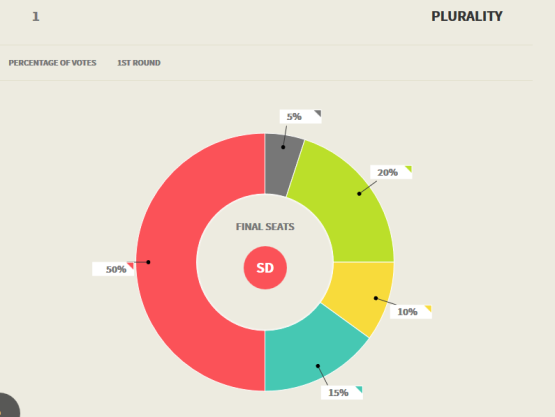Monthly Archives: April 2015
Out of nowhere, earlier in the week, my Note 4’s camera went on the fritz. Basically, holding the camera reasonably steady, photos started looking like this:
And videos like this:
It was doing this across different camera apps (“A Better Camera” is a good app, if you’re curious), suggesting that it wasn’t a minor software glitch.
Now, there are some features on my smartphone I can do without. For at least a little while. The camera, at this time in my life, is not one of them. The ability to take pictures in a matter of seconds is very important when you’re the father to a two-and-a-half year old girl who happens to be the cutest and most amazing in the universe.
So I found myself wishing that if some core functionality had to go, why couldn’t it just be the ability to make and receive calls?! That I could do without for a while as I try to figure out what the problem is. But camera? I might as well switch to the S5 I use as a backup. That would also allow me to do a factory reset of the Note 4. Which I did, and the problem persisted.
The Quality Assurance dude in me appreciated that the error was so reproducible. Reliable errors are the best errors. But what to do? This was evidently a hardware problem.
My childhood best friend words at Problem Resolution at Verizon, my provider. So I asked him what to do and he recommended I call Verizon. Which I did. And let me tell you a thing or two about their customer service…
It was friendly, sometimes exceedingly so. The woman acted like a dead phone was the Worst Thing In The Universe, even though I was pretty nonchalant about it by the time I called them. This is what I keep the S5 around for.
It was helpful. While we were waiting, she took the opportunity to look over my account. I feared having to fend off some upselling, but she actually tried to downsell me, informing me that we are on a much higher plan than we need to be. I appreciated it, but our use is erratic and I never want to be in the situation of scrambling to upgrade again, even if it costs a bit extra per month. I like not having to worry about it, but it was great that she asked me about it while we were killing time.
It was helpful. I had a problem, with a minimum of fuss and didyatrys. I was kicked up once, but it was pretty quickly established that they would have to send out a new phone.
This could all go to pot if – after I send them my present phone – they say something like “the warranty isn’t valid because you damaged the phone” (I didn’t). It’s also, by a stroke of luck (and Verizon’s stiff measures) not rooted, which kept the warranty valid through no choice of my own.
So the phone is going to be arriving this weekend. I want to be excited about it, because I always love getting new stuff, but this is going to be the exact same phone I currently have (albeit with a working camera).
In the meantime, I am reminded why I upgraded from the S5. If you’d have told me five years ago that I would be upgrading from a phone with a 5″ screen because the screen was too small, I’d have thought you were crazy. I can’t wait to know what kind of phone I will have five years from now. (Though, alas, it probably will not have a removable battery. Sigh.)
Paul Krugman makes the following observation about Atlas Shrugged:
After all, what is Atlas Shrugged really about? Leave aside the endless speeches and bad sex scenes. What you’re left with is the tale of how a group of plutocrats overthrow a democratically elected government with a campaign of economic sabotage.
As it happens, I watched the third and final movie recently, which has it fresh on my mind. As I watched it, the phrase “economic terrorism” came to mind, with regard to Galt’s tactics. The book does attempt to establish the moral basis for what it’s doing, with the pirate only sinking ships of ill-gotten gains and Wyatt and d’Anconia destroying what was theirs to destroy. From a certain vantage point – Rand’s – doing anything else out of kindness or decency would have been the self-treachery of living for another man.
Nonetheless, I found Wyatt’s actions distasteful, and it was something I never quite got over and never could square with my most libertarian of instincts.
That being said, Krugman’s argument here is even more of a stretch than Jonathan Last’s seminal piece in defense of the empire from Star Wars. Even from a liberal prospective, and no matter how much one disagrees with Galt’s (and Rand’s) solution, the democratically elected government of Atlas Shrugged was rotten to the core.
That touches on a comment I made from a previous post on the book:
By far, the most surprising thing to me – perhaps the only really surprising thing – was the extent to which the villains were roughly as wealthy and individually powerful as the heroes. The poor were the hordes at the gate, but collectively a villain in the background. The bigger villains were corrupt businesspeople, unions, and the government they were propping up. The unions being there weren’t a surprise, obviously, but I wasn’t expecting corrupt and self-serving businesspeople to get much more than a passing mention, if any at all.
It’s not just that the Thompson regime was liberal and socialist and ideologically bad (from Rand’s POV), but they were hopelessly corrupt. They had their blindness, but it was pretty transparent from the book that the ideology was a means to an end. Not even along the usual critique, which is that they use big government to become powerful, which they then use to increase their own wealth relative to everyone else. They’re shoplifting on a sinking ship, after having stolen the floorboards, but they were lining their pockets as best they could. The government presented isn’t just a failure by conservative or libertarian standards, but by liberal ones as well.
Which gets us to the “democratically elected” part. While it is presumably true that Thompson was elected, it’s difficult to ascertain the circumstances surrounding it. Putin was elected, and would almost certainly be elected in a free and fair election, but there’s enough going on to cast a shadow over the entire regime. Once incumbents have enough power, even accurate elections are somewhat beside the point. And you can have multiple candidates that are essentially fronts for the same regime. Which is a criticism I hear of the American system… from people on the hard left as much as anywhere else. The legitimacy of the regime is in question.
Democracy may be better than the alternatives, but it does not render corruption legitimate. And corruption that runs deep enough can, under at least some circumstances, render legitimacy to a coup. Or at the very least can justify a war of secession. Which is kinda sorta what’s going on.
From an ideologically secular standpoint, Atlas Shrugged would, to me, be a more interesting book if it actually did involve familiar states (either of the nation-state or the state-state variety). If, say, Galt and company were to relocate to Washington or Oregon instead of Colorado and set of a Free State sort of deal, with an eye towards independence. And in the time and place of the novel, both in our timeline and theirs, it would be incredibly difficult for a western Freedonia to gain a foothold. It would be giving their opponents a nation to attack, after all. On the other hand, with sufficient economic sabotage and stealth…
Such a plot runs counter to Rand’s political thesis, though, so from an ideologically sectarian standpoint it’s a non-starter. It also, at least arguably, points to a flaw in the hyperlibertarian model, which is that freedom needs to be defended. That requires organization. If not conscription, then a lot of people. More people than could ever meet the stiff threshold of the competence required to be invited to Rand’s Atlantis.
Will Wilkinson (H/T Dave Pinsen) said the following:
By the way, Atlas buffs, the point of Atlas Shrugged is not that you are John Galt. The point is that you are not John Galt. The point is that you are, at your best, Eddie Willers. You’re smart, hardworking, productive, and true. But you’re no creative genius and you take innovation — John Galt — for granted. You don’t even know who he is! And this eventually leaves you weeping on abandoned train tracks.
Willers is, of course, left behind right next to Hannity and Beck. The problem is that you would need Willers – an army of him, really – to be able to secure the sort of (dare we say it?) state from future pilfering. In addition to the magic power generator that Galt built, there is also the magic cloaking device. Which may work, for a time as the pieces of the former United States of America rebuild. But eventually they will. And though Galt imagines a confederacy of colonies, eventually a society will rebuild and conflict will erupt. Probably a fascist one. A Monroe Republic. And while it might take them longer to find the hidden colonies than the Free State of Washington, find it they eventually would. The only defense would be the equivalent of Project X in the hands of the Atlantians.
Which leaves Atlas Shrugged ultimately as a contest between the corrupt government of ruin, or the likely promise of ruin in the future. Whatever the morality of the cause, it’s difficult to entirely shrug off the looters and the moochers, when they have you so severely outnumbered.
-{Ed note: The bulk of this was written a few weeks ago. It got lost in the shuffle.
A little while back I had a flashback post to old promos for fall seasons of ABC and Fox. Here’s one for just about every network:
 The legend of used panty machines in Japan is perhaps more fiction than fact. Oh, well. Happosai was still kinda cool.
The legend of used panty machines in Japan is perhaps more fiction than fact. Oh, well. Happosai was still kinda cool.
John Nova Lomax writes about the deliberate transformation of Texas from a southern state to a western state. I don’t blame Texas for wanting to move past its confederate associations. Would that more states had a way of doing that. I’m far more perplexed by people in Oklahoma, Missouri, Kentucky, and West Virginia who seem to feel some allegiance to something they should be trilled that they weren’t (technically) a part of.
David Wheeler argues that Silicon Valley has declared war on Millenials.
New research suggests “plain packaging” on cigarettes reduces smoking’s appeal to teenagers. Which I thought was cool because I am down with plain packaging laws. Unfortunately, they don’t seem to be talking about “plain packaging” as much as “revolting packaging.” Fortunately, we’re less likely to find that horror porn come to fruition over here.
I bet you want to see some hilariously bad Kindle book covers, so here you go.
Sarah Rainey writes in the Telegraph about the Nazi Bride Schools.
I am not surprised that support for government redistribution is falling among the elderly (a lot of what they get, they don’t see as such), but I am a bit surprised about African-Americans.
It’s really, really difficult to describe why exactly watching little ones can be as exhausting as it is. There’s just nothing to compare it to. Here’s some research.
As the university becomes marketized, perhaps we should embrace a model where some students have to go to chapel, and others to workshops.
Todd VanDerWerff makes the case that the best sitcom of the ’90’s was NewsRadio. I’m not sure if it was the best – there’s a lot of competition – but it’s up there.
Caste-based discrimination is helping Christianity convert Indians.
Homekist crackers – which may be a Walmart housebrand as I have never found them anywhere else – are about half the price of even the cheapest of other saltines. You might be thinking “you get what you pay for” and… you’d be half-right.
The odd thing about Homekist crackers is that they have almost no quality control. I don’t mean that they’re terrible. I mean they are terribly inconsistent. They may be the most inconsistent packaged food I’ve ever purchased.
A good batch is as good as any name brand saltine out there. Better than most. Really good. Crispy. Great.
A bad batch is just terrible. They come out of the packaging half-stale. They’re cracked and broken. Sometimes you will lose up to a fifth or so of them to being only suitable for soup because they’re so crushed.
And there is no way of knowing which kind of batch you are going to get. There are some batches that are in between, but they mostly gravitate towards the great and the terrible.
Speaking of Walmart crackers, their reduced fat “Thin Wheats” are better than Wheat Thins.
Libertarians are sometimes accused of a certain “glibness,” or a Fish You I’ve Got Mine mentality. And that accusation is in evidence in some of the responses to Jason Brennan’s recent Bleeding Heart Libertarians thread. In that thread, Brennan addresses an ad hominem he found on twitter. That ad hominem calls him to task for an argument he has made in the past about the role today’s adjuncts have played in their own poor job fortunes. Whatever one thinks of Brennan’s post–and I agree with it–it highlights a kind of argument that the unconverted sometimes interpret as glibness.
I’ll call that argument the “one momentous choice” argument. Here it is, from the original argument that Brennan had made:
Adjuncts are people who played what they should have known, and in most cases did know, was a risky game, and lost…They are more like formerly rich people who understand statistics, but who decided to bet the house in Vegas anyways.
The “one momentous choice” argument refers to a mistake someone made and should have known better than to make. That mistake should govern the rest of that person’s life circumstances. No help, no sympathy, is merited or ought to be forthcoming. The person made their bed, etc., etc.
No, that’s not really Brennan’s argument. It’s only part of his argument. The other part is that in the case of adjuncts, there is an opportunity for exit. Another part is that the higher ed system is corrupt and needs some fixing, and as Brennan said in response to my comment, he pushes for reform “internally.” Yet another part (not stated in that particular post) is the very reasonable question of why someone else’s mistakes should be a third person’s obligation to remedy?
My point is, though, that the argument seems glib. To the “glib” caller, the argument probably seems like a radical and unrealistic insistence on responsibility to which few of us are ever really held accountable in real life. The “glib” caller probably believes that we’ve all made mistakes and few of us would want to live in a completely just world where we’re accountable for each and every one of the mistakes we’ve made. Not to deny the importance of responsibility, that person believes themselves to be just trying to point out even the hardest working and most deserving among us have gotten breaks. And as the ad hominem Brennan is responding to claims, Brennan is an “overprivileged libertarian faculty member who believes in his heart of hearts that he somehow beat the house.” He’s already got his, so the ad hominem implies.
I’m not a big fan of ad hominem’s in general and don’t like that one in particular. And again, I agree with what Brennan says in that OP and what he’s said in other OP’s about the “plight” of adjuncts. But I do think this particular example highlights why some libertarian ideas have a hard time gaining much currency. And although there’s perhaps no other way for Brennan to make the argument he does without coming off as “glib,” it’s hard not to acknowledge that there’s something understandable (not particularly defensible, but understandable) about the “glibness” argument.
Last week, Tod Kelly and I both wrote about some goings-on in Parma, Missouri, where the town elected a black mayor and suddenly everybody quit. We both suspected that it was mostly corruption with a side of racism. It turned out to be mostly petty small-town politics (though with perhaps a more generous helping of racism).
Which brings us to Kinloch, Missouri, where another newly elected black mayor has run into some resistence:
Betty McCray was not only prevented from entering city hall, she was also told she’d been impeached before she got a chance to start.
McCray ran for mayor in the April 7 election and won.
“I won. The people spoke,” McCray said. “I was sworn in by the St. Louis County. Today I take office. I want them out, I want the keys.”
After the election results were certified earlier this week by the St. Louis County Board of Elections, Kinloch’s outgoing administration refused to allow the city clerk to give McCray the oath of office, claiming voter fraud.
“Today is the first day that that the city hall door has been unlocked. They keep it locked,” McCray said. “You got to beat and you got to bang (to get in). They have an officer police sitting right at the door.”
Given that Kinloch is overwhelmingly African-American, this is likely a dish made almost solely of petty small-town politics and/or corruption.
Remember when we were talking about Parma having 6 officers for 700 people? Kinloch has 20 for 300. To be fair, that is likely to be a holdover from when Kinloch had a population in the thousands, twenty-five years ago.
In late 2013 and early 2014, there was a big to-do in Kinloch when a previous mayor, Darren Small, was removed from office by a judge after pleading guilty to a failure to pay child support. The interim mayor, Theda Wilson was arrested when she called the police about a burglary. She then made moves to abolish the police department, but Small was apparently reinstated before that happened.
Unlike Parma, which is strictly rural, Kinloch is a suburb of St. Louis and near St. Louis’s primary airport, which used to be called Kinloch field. Here’s a picture of Teddy Roosevelt at Kinloch Field:
 How two similar-looking black men with the same name gave birth to the process of fingerprinting in criminal justice.
How two similar-looking black men with the same name gave birth to the process of fingerprinting in criminal justice.
A speculative look back on what the Martian ocean may have looked like.
Leonard Pitts laments the equating of politics and moral character.
Jon Cryer wrote an autobiography where he talks about watching the meltdown of Charlie Sheen.
New York has high cigarette taxes, which results in a significant black market. Much of which comes from Virginia. So what responsibility, if any, does Virginia have here? There are some interesting parallels here with NY:VA::USA:Mexico.
I don’t know whether to be happy or sad that our county isn’t on this list of fast-growing exurbs of DC.
Heather Gerken and James Dawson explain the virtues of spillover state laws, which is when a law in one state has an effect on another. They approve! As a would-be federalist, so do I.
As we’ve transitioned from cigarettes to smartphones, William Davies wonders what we lost along the way.
Brandy Zadrozny vs Liz Pardue-Schultz on whether or not stay-at-home mothers should be able to call what they do a “job.”
The stereotype is of women whose biological clocks are tick-tick-ticking trying to convince reluctant men to have kids, but that’s not always how it works and in fact it more often works the other way. I know in my life, where there has been a disparity, it’s usually been the women that are more reticent than the men.
Everything you may have wanted to know about chasing gravitational waves.
I share James’s defense of the liberal arts in his post a couple weeks ago. But I have mixed feelings about the promises professors sometimes make on behalf of them. One promise is that prospective employers “look at” your writing ability and ability to think critically. Another promise is that a liberal arts degree will be “useful” in the business world.
My feelings are “mixed about” and not “completely opposed to” such promises. My sense is that writing proficiency and critical thinking ability–along with work ethic, collegiality, and overall competence, however defined–helps one keep a job. But getting the job in the first place depends more on internships, networking, or credential signalling (a proxy for liberal art’ish skills, but not the same thing) than on demonstrated writing or critical thinking ability. Perhaps a good liberal arts programs introduces its students to these things, but they’re separate from the actual study of liberal arts disciplines. (Or mostly so….we could argue that everything is all related and part of a lifetime curriculum and that that represents the true spirit of the liberal arts.)
As James points out, the paths from degree to career for liberal arts majors tend to be “so contingent, so unique and unrepeatable, that they provide little clear guidance.” That isn’t an argument against the liberal arts. In a sense, it can be an argument for the liberal arts inasmuch as it demonstrates the flexibility that comes with such a degree. But it is an argument against giving prospective students the assurance that intellectual engagement at college or simply attaining a degree is the key to success.
How much do people actually make such promises? Maybe not as much as I think or recall. Memory is always tricky, but my professors’ “promises” were at least sometimes qualified with a “or at least that’s what I’m told.” They weren’t necessarily promises to begin with, just statements of why studying liberal arts might be instrumentally useful.
I also remember only half-believing those “promises.” As an undergrad, I didn’t do all I could have or should have to develop my job skills (e.g., seeking internships), but I think I knew enough to know that a BA in history by itself didn’t really get one much of an entree into the work world.
And if I only half-believed those promises, I’m probably not the only one. In my undergraduate years, my sense is that among my fellow students, there was a certain belief that the liberal arts were easy and what people took when someone couldn’t hack it in a “real” major like the hard sciences, or math, or engineering. And let’s face it: it’s probably usually easier for a non-specialist to get a B in an upper level history class than it is, say, for a non-specialist to get a B in an advanced science, math, or engineering class. The prevalence of that belief suggests that it was hard to take uncritically the “promises” I mention above.
Therefore, however nefarious the promises might be in theory, they’re probably not as bad as those who might say their teachers lied to them. At worst, they probably just reinforce what the student wants to believe. Still, we shouldn’t make those promises without underscoring what James said in his post about paths to career.



